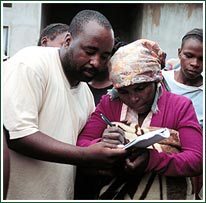|
|
 |
|
|
|

MNP Community Development Facilitation has shifted the focus of poverty alleviation through delivery of food parcels, fertilizers and other inputs to sustainable development through skills transfer. Great effort is made to focus MNP’s agenda on the needs of women. This entails reaching out to community organizations to learn what special constraints women face and then aligning their activities in an attempt to address this. Participatory Rural Development Approaches are used in the consultation process to promote assets building through:
Indigenous Knowledge
Indigenous knowledge, broadly speaking is the knowledge used by indigenous people to make a living in a particular environment. Utilizing it in sustainable development programs gives it legitimacy and credibility in the eyes of both local people and outside scientists, thereby increasing cultural pride and thus motivation to solve particular problems with local ingenuity and resources. Local capacity building is a crucial aspect of sustainable development. Indigenous knowledge can provide a powerful basis from which alternative ways of managing resources can be developed.
Traditional knowledge and marketing skills can allow people to contribute to their communities and to obtain and retain employment that pays a living wage.
Financial Holdings
MNP educate women that no matter how low their income level could be, they can learn to use a budget and to save. The Trust is another way that will ensure that communities share and benefit in the commercialization of the resource they own through infrastructural development.
Social Capital
Social bonds provide the social capacity and civic culture of communities as well as the webs of interpersonal and intergenerational relations among individuals that help break down the social isolation of the disempowered and provide a base of security and support.
MNP encourage interactive participation where people participate in joint analysis which leads to action plans and the formation and strengthening of local groups who determine the availability of the resource. Learning methods are used to seek multiple viewpoints and solutions. e.g. Pricing, Committee formation, Trust representation etc.
|
|
|